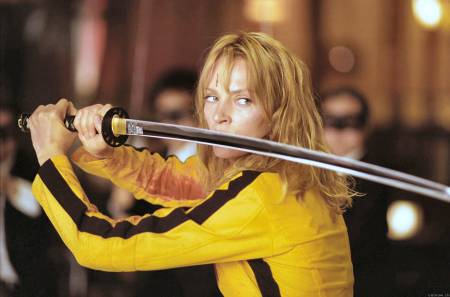Originally delivered as an address to the Midwest Conference on Language, Literature and Media (MCLLM) in DeKalb, Illinois. 2 April 2005.
On the surface, no two films from 2004 would seem more oddly paired than Ella Enchanted and Kill Bill: Volume 2. The former is a PG-rated fantasy film marketed primarily towards adolescent and “tweener” girls; the latter is an R-rated, action movie from the uber-violent imagination of Quentin Tarantino. Ella Enchanted centers on a protagonist who has been “blessed” by a magical spell that makes her obedient to every command given to her; The Bride is a powerful assassin on a mission to kill the man from whom she used to take orders. Despite these differences, I would argue that the films share one striking feature: on the surface, they both appear to advocate or celebrate female empowerment in their principle story lines. A comparison of the two, however, will reveal contrary or ambivalent feelings toward women’s ability to discipline themselves and thus effectively wield power and/or authority.
While both films address the issue of female empowerment, there is a key difference that warrants careful consideration when assessing the appropriate audiences for the respective movies: one film rather pointedly genders the virtues of obedience and subordination while the other treats these virtues more universally.
Ella Enchanted centers around a protagonist who is given the gift of obedience. Shortly after Ella’s birth, her fairy godmother, Lucinda (more about her later) casts a spell on Ella that forces her to obey every command she receives. The focus of the plot involves Ella’s attempts to find her fairy godmother in order to ask her to remove the spell. The plot reaches its climax when her step-sisters, Hattie and Olive, inform the regent, Edgar, about Ella’s condition. He uses the information to order Ella to assassinate his nephew, Prince Char, the heir apparent to the throne. As Ella lifts the dagger, she hears a series of voice-overs reminding her of all the commands she has had to obey throughout her life, interspersed with a memory of her new deceased mother reminding her that “what is inside” of her is more powerful than any spell. Ella does not break through the spell through willpower, however. At this key point she sees herself in the mirror and commands herself, “You will no longer be obedient.” Since the spell requires her to obey all commands, she must now obey the command to no longer be obedient.
So, are we looking at a film that celebrates freedom of conscience–sending the message to young girls that heroes are the ones that learn to say “no” to authority (when it is corrupt) and make autonomous moral decisions? Maybe, maybe not. Jonathan Culler said “to deconstruct a discourse is to show how it undermines the philosophy it asserts, or the hierarchical oppositions on which it relies.” How does Ella Enchanted undermine the philosophy of female empowerment?
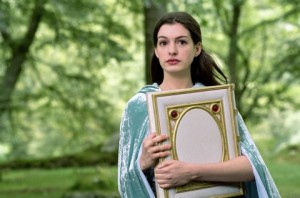
We could begin to answer this question by looking at the scene in which Ella breaks the spell. Certainly it is worth noting that upon gaining her freedom the first major decision Ella makes is to resubordinate herself through marriage to Prince Char. The film may advocate freedom, but its inability to imagine what to do with that freedom is telling. This point becomes more significant when we consider the voice-over from Ella’s mother–her final words to Ella are, “What’s inside you is stronger than any spell.”
I’ve already mentioned that the film remains ambiguous about whether the spell is broken through the exercise of willpower (tied to the timely reminder of her mother’s advice) or trickery (the timely exploitaiton of the nature of the spell at the sight of the mirror). In either case, however, the film brushes over the fact that both options have been open to Ella her whole life and are only exercised at the point that her curse threatens the life of Char. (In an earlier scene, Ella is nearly run over by a carriage because she can’t–or won’t–break the spell to save her own life.)
Of course, most fairy tales are bildungsromans, so in the genre we could–in face I would–argue that we are supposed to look at the mother’s dying words not as an instruction that goes unheeded for years but as a seed that will eventually bear fruit when Ella is ready. After all, if Ella were capable of breaking the spell at any time, there would be no reason for her mother to wait until her own death bed to tell her so. Therefore, there must be some hope that Ella will remember these words and be able to break the spell at an appropriate time in the future. What does “appropriate” mean in this context, though? What must Ella learn before she can unleash the power that is “inside her” and break the spell?
I would argue that what Ella has to learn is to internalize the curse. She can only safely be free from the curse when it becomes superfluous because she has learned the lesson that female power is inherently untrustworthy and can only be unleashed or set free when it is subordinated to a higher power or authority. This reluctance/inability to use one’s own power is mirrored in Ella’s aunt (played by Minnie Driver) who is revealed at the end of the film to, in fact, have had the power to release her own beloved from a book in which he has been trapped, but can only bring herself to do so when a safe social order has been established.
That female power is inherently dangerous because females are intrinsically less disciplined is a message that permeates the film’s portrayal of other characters as well. The clearest examples are Lucinda, the fairy godmother, Hattie, and Olive.
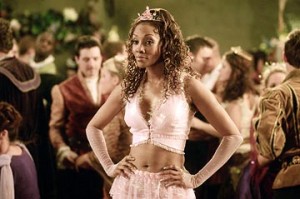
Lucinda is a true foil for Ella–a warning of what happens to females who are prematurely liberated from external constraints. Lucinda is both self-destructive and dangerous to others. When Ella begins her search for Lucinda, she asks the magic book to show her Lucinda’s location. We are told in a pointed aside that Lucinda has been pulled over for an “FWI” (flying while intoxicated). Later we are told that Lucinda has checked in to a rehab clinic, and it is intimated that there is a high rate of alcoholism (or other addictions necessitating rehabilitation) among the fairies. This inability to discipline one’s own desires is subtly but clearly portrayed as being the natural outcome of unsubordinated female power.
Another trait exemplified in Lucinda, and echoed in Hattie, is impulsiveness. Lucinda is clearly shown as giving the gift of obedience to the baby Ella because she (Lucinda) is irritated by the baby’s crying. Her inability to deal with frustration or irritation is a trait that is tied to her always getting her own way. The trait of obstinacy is further gendered when the narrator, played by Eric Idle, tells us that Ella “never stopped fighting” to have her own way. This quote suggests–to me, anyway–that Ella’s natural willfullness is no different from Hattie’s or Lucinda’s. The only real difference between the female characters, then, has been their situations. Whereas Ella’s has had constraints put on her and become a compassionate, loving, young adult, Hattie and Lucinda have experienced relative freedom and have become selfish, impatient, impulsive, and reckless withces and bitches.
It is also significant to note that the environment of freedom or subordination apparently operates differently on males and females in the film. Almost immediately after the curse is given to Ella we are told by the narrator that Ella’s mother and aunt decided not to tell anyone about Ella’s gift, and, we are specifically and pointedly told, they deliberately decided not to tell her father.
The point here is that Ella’s gift makes her vulnerable–and it does. Blind obedience can be, and often is, manipulated by the unscrupulous. But the insinuation is that Ella’s obedience makes her particularly vulnerable to men–that even relatively good men would not be able to resist the temptation to abuse absolute power over another human being. It is here that the film most clearly undercuts itself, since it is Hattie and Olive who most frequently abuse Ella and take advantage of her powerlessness. Ella’s father, because he is kept in the dark, and his obliviousness hurts Ella because he is unable to use whatever social or domestic power he has to protect or help her.
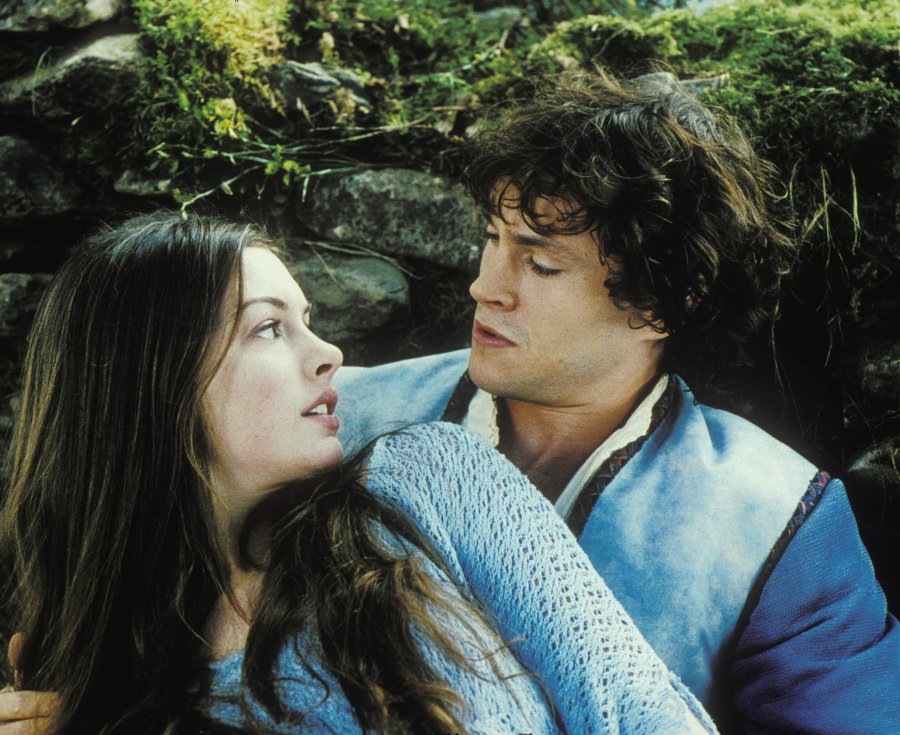
The dissonance between the expectation and reality in the film’s treatment of male power is similarly mirrored in the character of Prince Char, Ella’s love interest. Char’s father has been killed and Char has been told that a band of Ogres was responsible. Yet when Char rescues Ella’s from a party of Ogres, he does not take vengeance on them, instead saying, “I’ll spare your lives where you did not spare [my father’s].” The significance of this quote is that in the case of the male character, the relative freedom from constraints has not had the same corrupting effects it has had on the female characters. Char is able to wield power and authority instinctively and benignly. When Char listens to a part of Giants at a wedding, Ella says, “You are a natural at this.” The word “natural” is significant–male dominance is a natural state, not merely because it is the way things are in nature but because it is the logical fulfillment of the natural characters of both genders. Lacking an external power to corrupt or dissuade, the male’s natural goodness and integrity will create stability; lacking an external power to subordinate or discipline, the female’s natural selfishness and impetuosity will create anarchy and suffering.
Ella Enchanted is not the only film of 2004 that grapples with the theme of female empowerment. Beatrix Kiddo, a.k.a. The Bride, is the heroine of a very different movie with a very different intended audience. Like Ella Enchanted, Kill Bill: Volume 2 presents a character who, although she appears empowered on the surface, has been subordinate most of her life. After Volume 1 has spent time establishing The Bride as an autonomous and lethal power in her own right, Volume 2 gives us a back story that tells us not only why she is seeking to kill Bill but how she acuired her awesome martial arts skill and the power that accompanies it.
Not surprisingly, it was through a sustained subordination to male power, in this case to Pai Mei, a wizened martial arts expert to whom Bill–gives?–lends?–recommends?–Beatrix for training. After he physically bests Beatrix, Pai Mei reminds her that the power to destroy a thing is the ultimate form of ownership and that, hence, he now “owns” Beatrix. This ownership is corporeally symbolized by her arm, which he threatens to break if she does not acknowledge his ownership of it by–hmm, who does this sound like?–being perfectly obedient to his every command. In a typical exchange, Pai Mei punches through a block of wood three inches away. He then says, “Since your arm now belongs to me, I want it strong. Can you do that?” Beatrix responds that she cannot, and Pai Mei orders her to continue to try, subordinating her own pain and potential injury to his command.
In both Kill Bill: Volume 2 and Ella Enchanted, training and initiation–whether it be formal or informal, requires of the female protagonist that she subordinate not merely her body but her will to a superior power before she can be deemed worthy of, or safe for, having power bestowed upon her.
The Christian theological label for such an attitude towards female subordination is called “complementarianism.” Based on an interpretation of passages such as Genesis 3:16 (“Your desire shall be for your husband, and he shall rule over you”) or Ephesians 5:22 (“Wives, submit to your own husbands, as to the Lord), complementarianism (and yes, I know I’m oversimplifying here for time and effect) holds that gender differences are innate and that the subordination of females to males is ordained by God. In some forms of complementarianism, there is a belief that part of the reason for the subordination is grounded in the greater weakness of the female character–a weakness that is not merely physical but also pervades her morals and her will. It is my argument that Ella Enchanted, despite its wink-wink “You will no longer be obedient” feminist gloss, depicts a thoroughly complementarian world view and hence retains an appeal to fundamentalist (or socially conservative evangelical) Christian audiences who can support a film that simultaneously purports to champion female empowerment while continuing to reinforce all the stereotypes and assumptions that undergird the correctness of male domination.
Kill Bill: Volume 2 is a bit more complicated, though, because while it clearly present Beatrix’s subordination to Pai Mei as a good thing (Beatrix’s training saves her life several times), the goal of eventual freedom from tyrannical (and not coincidentally, male) authority is the purpose of temporary subordination.

As an aside here, I am tempted to discuss to what extent Beatrix’s submission, in comparison to Ella’s, is a willing one. Both films leave some room for argument about whether either character had the power to choose to reject subordination, and, if so, at what point. I turn aside from that tangent to note in passing that Beatrix’s willingness to accept subordination to unusual extent ends up being a saving grace at least twice in the film. First, when she is buried alive by Bud, her acceptance of the “cruel tutelage of Pai Mei” empowered her to escape from a circumstance that would otherwise have been beyond her ability. Later, when Beatrix defeats Elle Driver, it is revealed that Elle, while receiving some training from Pai Mei, was unable or unwilling to accept subordination to the same degree as Beatrix and hence was not privy to some of the training that Beatrix was.
More telling, for me, are the final scenes between Beatrix and Bill, since they explicitly reveal that her subordination to Pai Mei did not result in an internalization of the principle of subordination but in a new found independence from other, more corrupt, male authority. While it was apparently Bill’s hope that Beatrix would remain subordinate to him after her training–and she does for a time–he eventually discovers that Pai Mei has equipped Beatrix to make an independent choice. He has taught her the “five point palm exploding heart technique,” a martial arts move that Bill explicitly says Pai Mei has not taught to him. After Beatrix has used this technique on Bill, but before he takes the five steps that will result in his death, he asks her, “Why didn’t you tell me?” Beatrix’s reply–“I don’t know…because I’m a bad person” makes perfect sense in the context of complementarianism–where by definition an empowered woman is a bad woman. But the fact that Pai Mei teaches this technique to Beatrix (and, apparently, only to her) underscores the film’s rejection of the complementarian argument for subordination–Beatrix does not need to continue to submit to Bill after she has submitted to Pai Mei precisely because the level of her submission to Pai Mei has evidenced a degree of self-discipline and self-control that are absent in the gender that has ostensibly been ordained to lead.
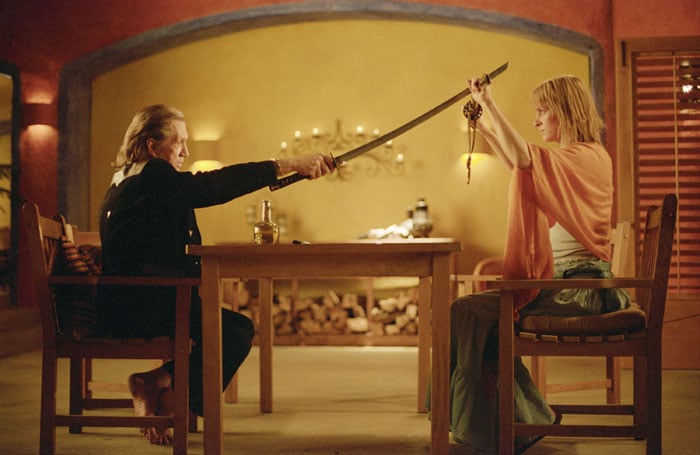
Consider Bill’s reply when Beatrix finally poses him the question of why he and assassination suqad killed Beatrix’s fiance and tried to murder her. Bill says: “I’m a killer. A murdering bastard. You know that. And there are consequences to breaking the heart of a murdering bastard.” So while subordination is portrayed as a good thing, it is not gendered in Kill Bill the way it is in Ella Enchanted. It is also not permanent. Bill’s inability to subordinate his own will to anything higher than himself leads to a lack of impulse control that prompts the shootout at the wedding chapel and eventually initiates a chain of events culminating in his own destruction. Beatrix’s worthiness to wield power is grounded not in an ordained judgment of her gender but a personal response to her character. Unlike in Ella Enchanted, female power is not just celebrated (only to be undercut) it is validated.
One might argue that Kill Bill: Volume 2 romanticizes the maternal instinct as the source of Beatrix’s moral instincts. There is a scene, however, in which Bill describes his and Beatrix’s daughter killing a fish that appears to underscore the fact that the inherent human condition–male or female–is one of willful and destructive selfishness. Male and female are portrayed as equally in need of disciplining power over them and equally capable of learning autonomous self-discipline. This insistence that characters be judged individually rather than because of their gender, that each person has the capacity to make meaningful moral decisions, is the essence of egalitarian theology and the principle reasons why, in many ways, I find Kill Bill’s worldview more honest and truthful than Ella Enchanted’s.
Well then, it remains to be asked, “So what?” Aside from my personal preference for one film over another, are there larger points to be illustrated or revealed through the comparison of these two films? I think there are several, but I’ll limit myself to one.
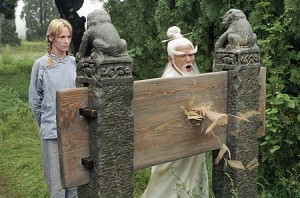
The fact that it seems odd, unorthodox, or against the grain for a Christian to judge Tarantino’s film superior–not just artistically but morally–to Ella Enchanted could shine a spotlight on some of the deficiencies of Christian criticism (cinematic or literary) as it is most commonly practiced. Christian criticism of the moment (as practiced by [names redacted]) is so singularly focused on classifying subject matter as inherently good or inherently objectionable that it leaves itself no meaningful way to describe, evaluate, and critique meaning.
Ken Gire said, “I would rather be told an R rated truth than a G rated lie,” a sentiment that is not only contrary to most contemporary Christian criticism but which would be essentially meaningless in an evaluative rubric that is strictly quantitative. That is to say, a systematic evaluation that rests on a foundation of classifying subject matter and consists primarily of counting (swear words, body parts, instances of drug or alcohol use) has no logically consistent way of arriving at a preference for Kill Bill over Ella Enchanted. I’m not even broaching here the value of interacting with a well crafted work of art that one might ultimately deem to be morally or philosophically deficient–though I will say, as an aside, that I think there is some. Rather, what I’m trying to point out is that the question of moral truth (which I’m defining here as a work of art’s thematic conformity to or consistency with a pre-defined moral code or belief system) has no place in the current dominant Christan formula for evaluating the arts…and that’s scandalous. What most often ends up being endorsed is often not the excellent but the unobjectionable, not the the work of art that is morally or spiritually honest, but the one that is innocuous.
Certainly Mel Gibson’s The Passion of the Christ went some of the way towards forcing Christian critics (and maybe even a few Christian consumers) to confront the at times embarrassingly hypocritical results of what the Arts and Faith Film Critic’s Circle (now called the Faith and Film Critic’s Circle) has called a “ratings tyranny.” But I fear the–and I used this word narrowly–“exceptional” nature of that work may make it unlikely that that the inability to justify its endorsement when it is evaluated using the same criteria as any other film subjected to a “Christian” approach will lead to a reassessment of that approach as a whole. That’s too bad, because until Christian criticism grows up and shows itself able to interpret as well as judge, to decode as well as declare, to be deconstructive as well as didactic, it will be left in a ghetto of its own making–and Christian consumers will get the art they deserve. We will continue to be spoon fed My Favorite Martian instead of Million Dollar Baby, Ella Enchanted instead of Eternal Sunshine, and The Princess Diaries instead of Kill Bill.
I think we can do better. I hope, especially for the sake of our daughters, that we well at least try.


